Health Entrepreneurs
Today’s health start-ups are different. They’re part of a generation that has a pragmatic approach to their wellness. Meet the new health entrepreneurs.

Driving our healthy lifestyles are the businesses and business people that keep us in good nick. In the 1980s it was leotarded ladies en masse in aerobics classes. In the 1990s, punters shed pounds at the new high-street gyms. But today’s health start-ups are different. They’re part of a generation that has a pragmatic approach to their wellness. Meet the new health entrepreneurs.
Today’s wellbeing innovators cater to a generation – the Millennials – who have reached adulthood during a time of calorie counting, carb-cleanses and a well-publicised obesity epidemic. Today’s 30-year-olds are 20% more likely to be obese than 45-year-olds, and more likely to suffer from heart disease and diabetes, according to the European Journal of Preventative Cardiology. The American Psychological Association says that this is also the most stressed generation. Now the thirty somethings have had an important wake-up call: they’ve been told that they might snuff it before their parents. Health, for them, is a matter of necessity, not superficiality.
But while the Millennials’ future sounds bleak, they’re not panicking. They are an inventive bunch, after all. They include a handful of entrepreneurs who have developed their own small- scale health businesses. These are establishing precedents in wellness products, venues and services.
It’s this entrepreneurial mentality that has caused the explosion of cold-press juice bars in cities across the Western world. Examples include Moon Juice in Los Angeles, Bob’s (explored opposite) in Paris, and Lovage in London’s Ace Hotel. Juice has even become fashionable. Heartbeet Juicery, for instance, a locally-sourced juice brand in New York, recently opened within New York clothing store and fashion mecca Opening Ceremony.
Exercise entrepreneurs are side-stepping the high-street gyms and focusing on what’s important: core strength – the kind needed to improve everyday living. This can be seen at no-nonsense gyms such as Barber’s in London (featured on page 36) and Gotham in New York. Community is important too. Look at the rise of new running clubs that place sociable and fun exercise at their core, such as the Nike-sponsored Paris Running Club and Run Dem Crew in London.
Some start-ups have even turned exercise into entertainment. SoulCycle, an indoor cycling brand, is doing this with the humble exercise bike. There are still the bikes that go nowhere and involve buckets of sweat, but the difference is the chance to be part of an energetic party. Cycle sessions include loud, thumping DJ sets hosted by the likes of music and fashion collective Been Trill, and V-Files – the online fashion publication of V Magazine.
Over the next few pages of our Health Report we focus on five start-ups that are changing how we keep trim, balanced and healthy today – and how we might tomorrow.
Bob's Juicebar
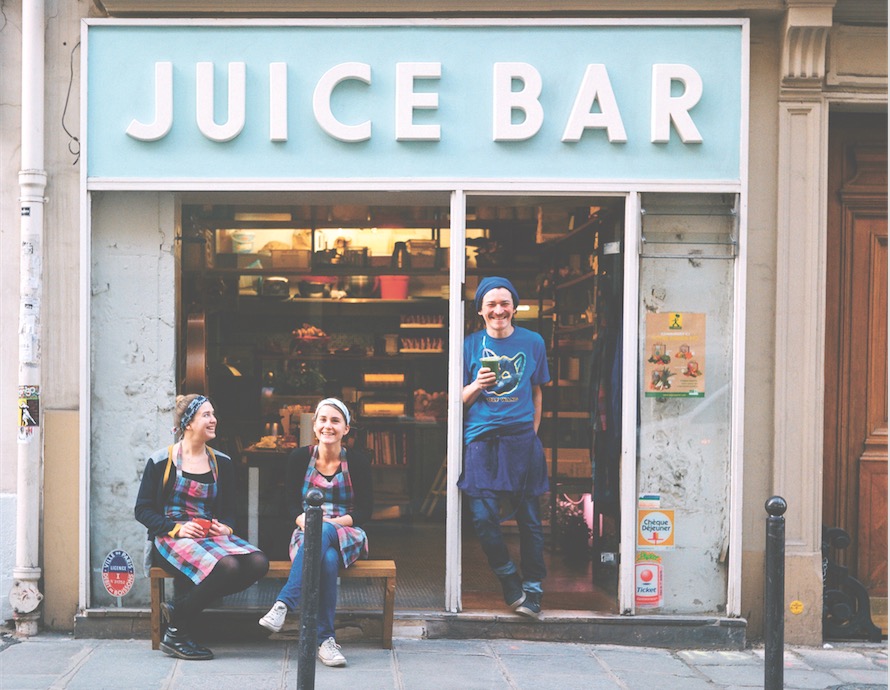
It’s difficult not to notice the hoards of thirty something professionals who rush to work in the morning with a carton of dark liquid in hand. Juice – the vegetable rather than the tropical variety – has taken over our cities. A few big chains aside, the phenomenon is being driven by a group of exciting young juice entrepreneurs.
In Paris, he’s called Bob. Actually, he’s called Marc Grossman – a trained film-maker who has founded a small chain of health-conscious juice bars under the name Bob’s. It began in 2006 when Grossman, who had considered opening a juice bar for some time, spotted a vacant shop opposite his flat in the Canal Saint-Martin district, while he was in the middle of reading through a script. “I stuck the screenplay in a drawer, borrowed some money and signed the lease,” he recalls.
This soon became Bob’s Juicebar – a cool juice spot that serves juices, muesli yoghurts and cream cheese bagels. In 2009, he teamed up with businessman Amaury de Veyrac. Together they opened Bob’s Kitchen, located further south, towards Le Marais, which added hot foods to the existing menu.
Health food on a mass scale might be new, but junk food is still going strong. Both feed each other Marc Grossman, Bob's Juicebar
Then came the third space, Bob’s Cold Press, which specialises in fresh juices with extended shelf lives, thanks to a state-of-the-art cold press in its kitchen. The next instalment will be a bakery, called Bob’s Bake Shop, opening later this year.
During all this growth, Bob’s has gained a reputation within the style world. This is partly because of its typical customer, who, according to Grossman, is
a “wealthy, fashionable woman in pursuit of maximum health”. It’s also because Bob’s Juice actively targets the fashion world’s in-crowd. For instance, the brand opened a temporary juice bar with creative agency The Sporting Project for Fashion Week in February 2013, with the intention of replenishing tired fashion folk.
Grossman has observed attitudes towards diet changing, often comprising of a move towards raw or vegan food – which he puts down to rebellion against the norm. “Health food on a mass scale might be new,” explains Grossman, “but junk food is still going strong. Both feed each other. It’s like a binge, then a purge. Yin and yang.”
Barber's Gym
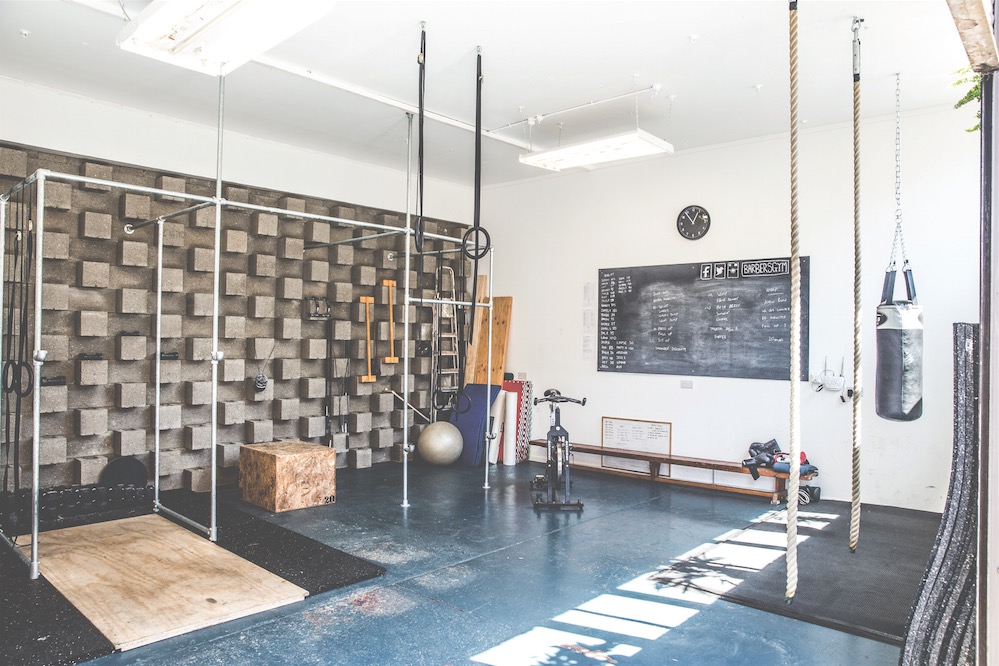
Barber’s Gym in Hackney is the latest fitness destination in London, but here there are no banks of treadmills, no fresh white towels and there’s certainly no thumping David Guetta soundtrack.
Instead, there’s a selection of dumbbells, kettlebells and barbells – modest free-weight fare – plus some monkey bars, hanging ropes and wooden benches reminiscent of those used during a primary school’s physical education class. All of this austere equipment is found behind a large metal door in a space that looks more like a car mechanic’s garage than an of-the-moment gym.
Barber’s founder, Darren Barber, a sport rehabilitation expert, has traded in the slick equipment of high-street fitness chains for basic gym tools because, according to him, it’s simply better for us. His gym’s motto is ‘functional fitness’ and its approach is a more holistic form of exercising. “It’s not just about muscles,” explains Darren. “It’s about flexibility, mobility, coordination and agility – the things that make your fitness more rounded.”
It’s about flexibility, mobility, co\-ordination and agility – the things that make your fitness more rounded Darren Barber, Barber's Gym
It’s the sort of fitness training you can’t get at high-street gyms, says Darren. “They all use fixed machines,” he explains. “When you use them, you don’t have to control your body. You just apply a force. In reality you should be able to stabilise yourself at the same time, and these machines take all that away.”
Customers at Barber’s are a mixed bunch – from thirty-somethings looking to get back into the training spirit of their university days, to a handful of elderly customers who come to Barber’s for specialist, one-to-one sessions. There is a commonality between many of them – an underlying injury, usually the result of an unhealthy lifestyle and often linked to the posture-harming routine of office work. “Laptops are awful,” says Darren, “they’re the enemy.”
This is where Barber’s functional fitness can help. By applying strength to the core, midsection of the body – the abdominal muscles, back, hips and shoulders – people’s bodies can be slowly rehabilitated; ready for the strains and stresses of the real world.
SLA
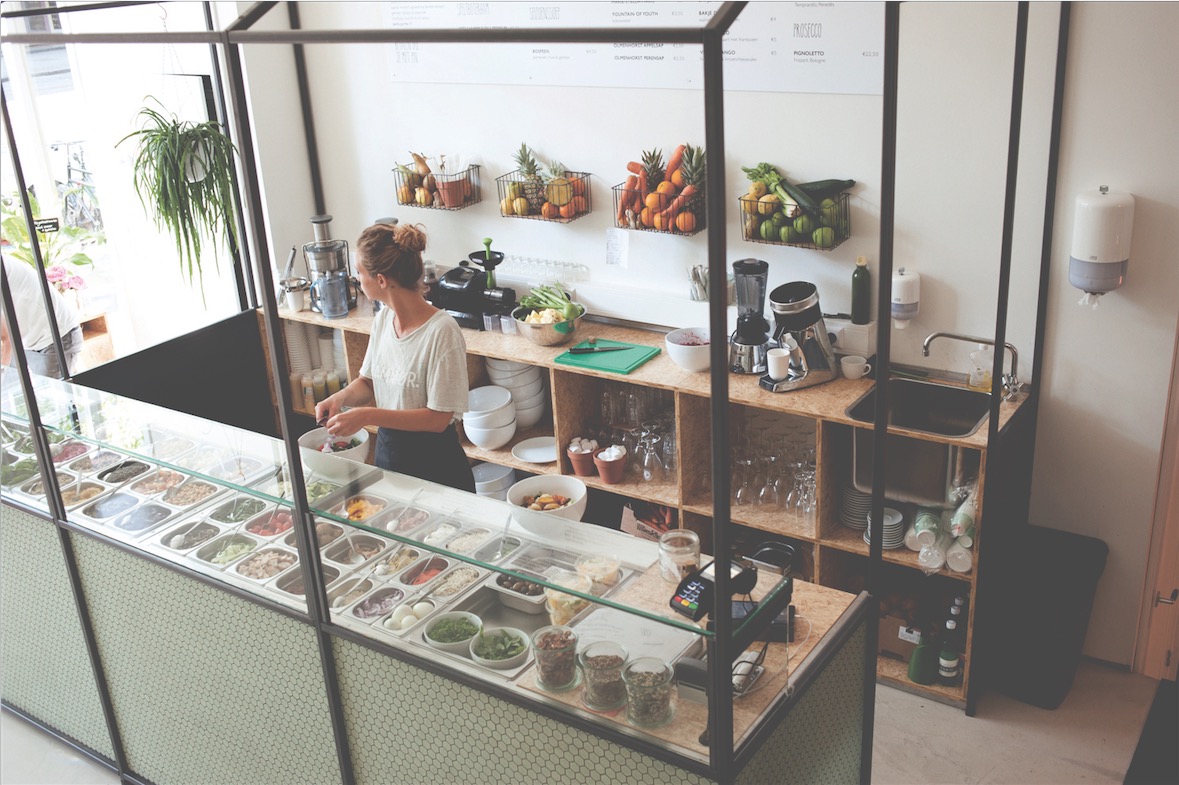
Jop van de Graaf and his girlfriend Nina Pierson had their lightbulb moment during a trip to Burma. “We read a book called The Food Hourglass,” van de Graaf recalls. “It’s all about how eating certain foods can influence the ageing process.”
Inspired by this, the pair decided, once they got back to their home in Amsterdam, that it was time to change their lifestyles. Healthy food would be the only thing on their menu from then on. However, they soon realised there was a lack of decent food venues to cater for these new dietary needs. So, as good entrepreneurs do, they grasped the opportunity, and decided to develop their very own health-conscious café.
The result is SLA, a salad bar in Amsterdam’s southern De Pijp district. It specialises in salads, soups, juices and snacks that aim to be both healthy and hearty. Typical fare includes Japanese-style marinated beef, roasted seasonal vegetables and a pumpkin, carrot, coconut milk and ginger soup.
The good thing about healthy eating and a conscious lifestyle is that it can never be over\-hyped Jop van de Graaf, founder of SLA
Customers tuck into their healthy grub in a space created by local design firm Nicemakers that looks just as fresh as the salads. Small terrariums feature throughout the eating areas and real moss grows on a wall in the toilet. The salad bar itself mimics the look of a greenhouse – a subtle nod to the need for transparency in food production.
The venue attracts a mix of healthy locals, while more serious foodies take part in the SLA laboratory, which hosts talks and workshops on healthy living. So
far the space has been a success, and van de Graaf and Pierson opened a second venue in December last year. Van de Graaf puts this down to the growing hunger for health among the city’s consumers. “The good thing about healthy eating and a conscious lifestyle is that it can never be over-hyped,” he says, “because once you go down that road you never go back.”
Ron Dorff
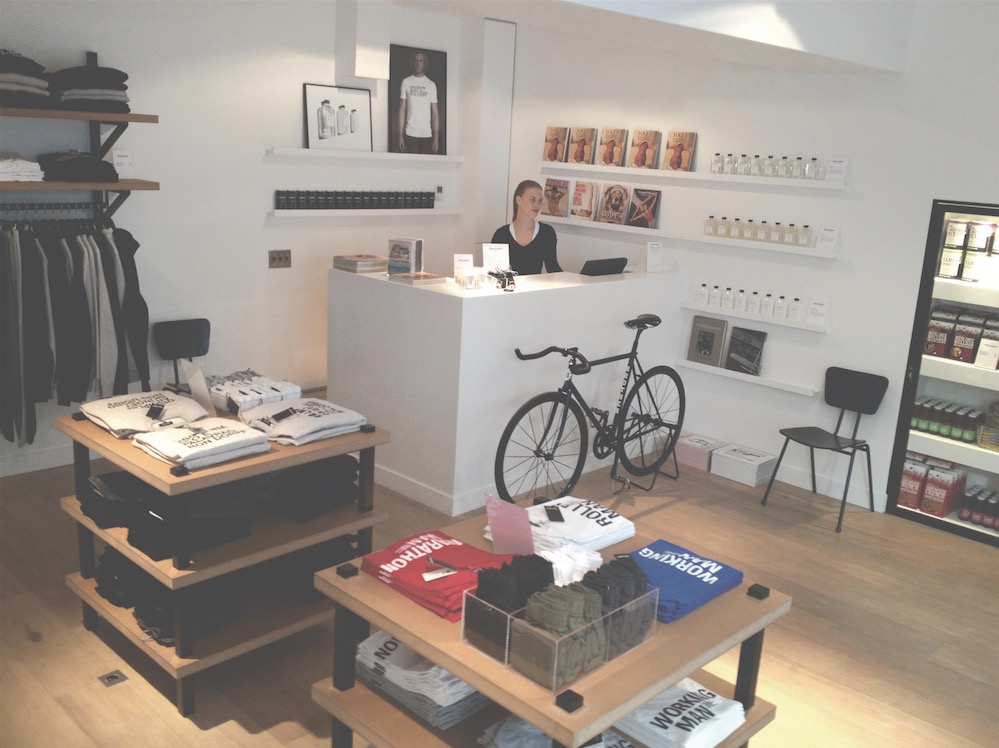
Chafing t-shirts, garish sneakers and heavy sweatpants that only seem to induce more sweating – men’s gyms today are awash with products that fail drastically at functionality and style. Not to mention the tangy smell of cheap deodorant in the changing room afterwards. Jérôme Touron and Claus Lindorff, French and Swedish entrepreneurs, recognised that not all gym-going men are content with such underwhelming sports goods. So in 2010 they created Ron Dorff, a premium clothing and bodycare brand fit for the modern male sports consumer.
The clothing – a range of sportswear, swimwear and underwear – mixes Swedish functionalism with French classicism, a combination of ideas that reflects the founders’ nationalities, and far removed from the high-tech aesthetic offered by sports brands. “It’s an alternative to over-designed and over-casual sportswear,” says Lindorff. The bodycare, consisting of bathroom essentials, is packaged in equally understated and modern designs.
Staying fit and healthy has become a part of people’s lives Claus Lindorff, Co-founder Ron Dorff
Ron Dorff quickly gained credibility, and underlined its style-conscious intentions, by restricting its stockists to the world’s top menswear stores, such as Colette in Paris, Selfridges in London and Club 61 in Singapore. It opened its first flagship in 2012 on rue Charlot in Paris.
Consumers are becoming more health conscious – for example, they are more enlightened about the harmful effect of junk food – and Lindorff believes that healthy living is now a core part of life for many people. “Staying fit and healthy has become a part of people’s lives,” he explains. “You could almost say that being in shape has become the new status symbol.” And, through its premium positioning, Ron Dorff aims to be the brand to dress men who have reached this physical apex.
The next step for the brand is to open stores in New York and London. Lindorff is optimistic that they’ll be a success. “If the French can fall in love with a brand that has ‘Discipline Is Not A Dirty Word’ as a leitmotif,” he explains, “then there’s no reason why it wouldn’t do well in London in New York.”
Stanley's Pharmacy
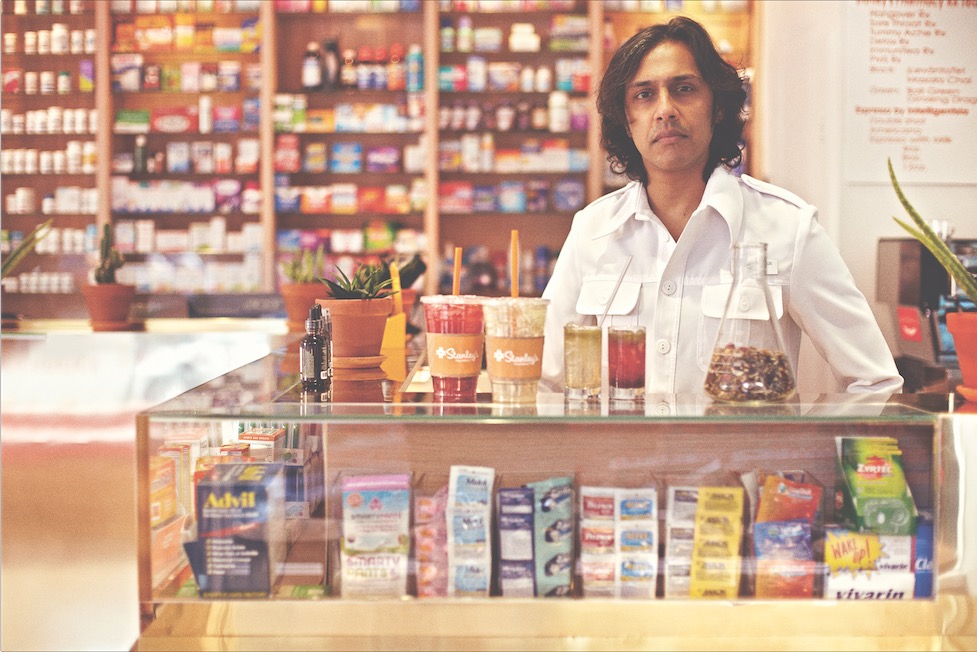
Pharmacies are supposed to be sites for healing,” says Stanley George, pharmacist and founder of Stanley’s Pharmacy in New York. The problem, he says, is that ordinary pharmacies in the US have become unhealthy places. “They’re airless, windowless, and downright depressing.” And he should know, having worked in them for most of his career. “Overstressed pharmacists don’t last long in these environments.”
He was able to endure a little longer while in California, where he balanced his pharmacist career with “a lifestyle that included mountains, ocean, sunshine and nature” – all the good things that everybody, in an ideal world, needs to relax. It was everything, he noticed, that stressed-out New Yorkers severely lacked. And so George dreamed up Stanley’s: a pharmacy that focuses on wellness, inspired by southern Californian lifestyles.
Stanley’s focus is on people rather than products. Located on a block corner of New York’s Lower East Side, it targets city customers who want to combine the best of both Western and Eastern medicine. “I cater to a customer who wants a different kind of healing to live their best lifestyle,” says George.
They’re tired, sick, hungover, suffering from allergies or dehydration, need a boost or just a break and need to relax Stanley George, Founder of Stanley's Pharmacy
This clientele comprises a diverse demographic, says George – everyone New York has to offer. They come for not only medicine, but also advice and attention – something that harks back to the days when people had a relationship with their pharmacist. Then there’s the Wellness Bar, where people can hang out with a magazine while George mixes up a concoction from his Drinks+Drugs menu. Signs of a scratchy cough? Have a Sore Throat tea. Recovering from a boozy night (a common complaint in the Lower East Side)? Then try his best-seller, the Hangover Rx drink. “I’ve also introduced The Life Changer, which sets your digestion straight in under four hours,” says George.
Stanley’s is a one-stop destination for wellness, where people can get medicine and a dose of personal care that might just help the healing process. “They’re tired, sick, hungover, suffering from allergies or dehydration, need a boost and to relax,” says George. “They’re dealing with New York City – and that’s a lot!”


